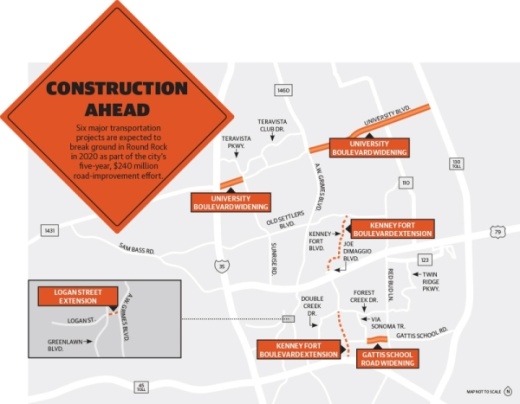“We’ve never had this volume of work under construction at one time,” Hudder said. “It’s going to be taxing on us, but we’re staffed for it, and we’ve prepared for it.”
Targeted projects
The city specifically targeted high-impact projects for the five-year push, Hudder said. However, he stressed a degree of “fluidity” to the plans, with some flexibility that could be driven by development, population shifts and other factors.
Hudder said the city selected roads that have become highly congested areas, such as Gattis School and University.•“The ones that are bad today are getting worse pretty rapidly,” he said.
Two of the projects expected to break ground this year involve different sections of University. From I-35 to Sunrise Road, an additional lane will be added in each direction as well as a median on the portion of University from I-35 to Sunrise. From A.W. Grimes to SH 130, University will be widened to a four-lane, divided roadway.
This, Hudder said, is an example of a project that will make an impact.
“The clear directive we were given from [City] Council is that we had to do something that made an impact—new lane capacity, new road capacity and the like,” Hudder said.
Funding
To pay for the transportation improvements, the city is relying on a variety of funding mechanisms. City Council issued the first of four rounds of certificates of obligation—to the tune of $30 million—in April 2019.
Additional funding for high-impact transportation projects in Round Rock over the next five years will come through Williamson County’s 2019 roads bond and city sales tax revenue known as Type B funding. Hudder said he plans to continue to seek state and federal funds.
“Aside from the debt funding, we’re attracting funding from [the Capital Area Metropolitan Planning Organization], the Texas Department of Transportation, the county and private developers,” Hudder said.
Private developers will help fund some transportation improvements around their project sites, Hudder said. Round Rock City Council approved roadway impact fees in March 2019, and the fees became effective Jan. 1. The mechanism requires developers to pay a one-time cost to fund transportation infrastructure.





